How to grieve and celebrate the Earth. Lessons on climate anxiety and living through loss
Masavi Perea sets the mood by connecting his phone to the speaker in a back room at Chispa AZ headquarters and hitting play on Track 7 from Encanto al Alma's 2017 album, "La Tierra de los Cuentos," or "The Land of Stories."
Members of the community wander in and fill the chairs set in a circle as the soothing but energetic blend of guitar, ukulele, mandolin and vocal sounds perfuse the room. They've come to what, for this moment, is Phoenix's land of stories, to tell each other their stories of struggle, of loss, of the land.
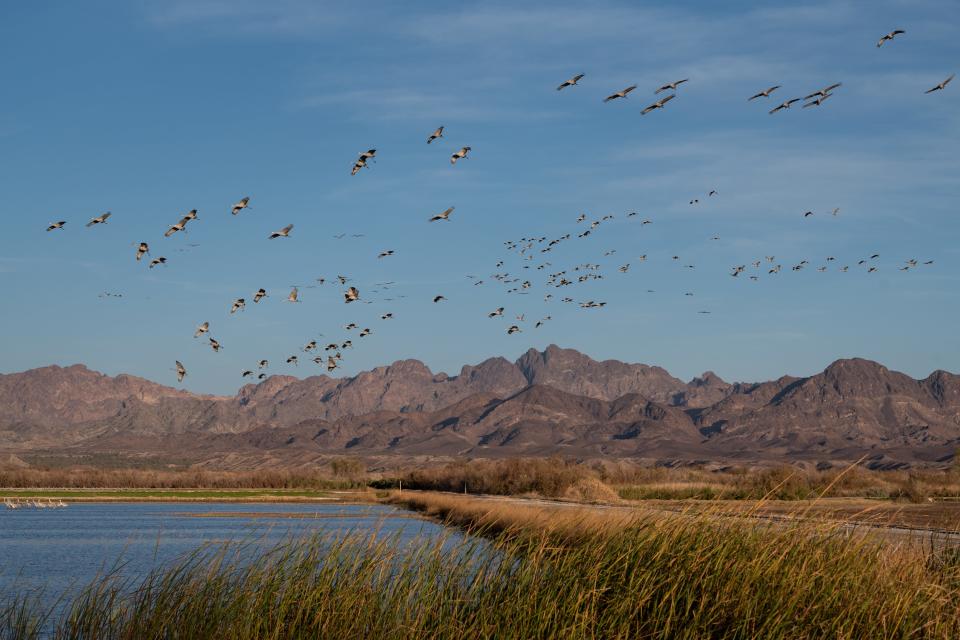
Araceli Montes, Perea's co-host at this monthly gathering, prepares for the "Community Circle" by forming a ring of colorful cloth on the floor and placing a plant, a full glass of water and a bit of smoldering sage in the center. It is a reminder, she explains, that "we are all equal and we are all divine. We are part of nature and nature is part of us," before inviting attendees to add an item of their own. Keys, phones, airpods and glasses come out of pockets and find their way to this shared space within a shared space.
The session begins with each person sharing, mostly in Spanish while Perea translates, something to celebrate: a daughter's graduation, a relaxed month, a reprieve from knee pain. Then the heaviness sets in. Time to discuss real, sometimes seemingly intractable problems.
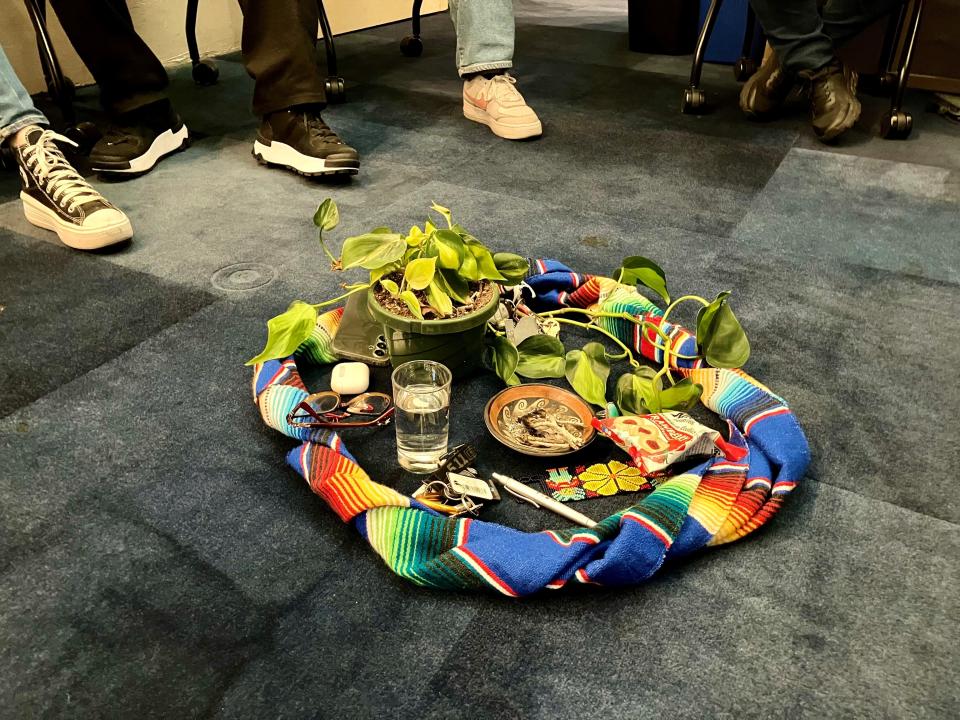
"Two years ago we took this training about community therapy," Perea told me in his office beforehand. "Moms were saying they needed some help. Mental health care is very expensive, even if you have insurance."
Perea and Montes' guiding concept is that the community is a place full of knowledge and solutions. They sit in a circle because "no one is the boss and no one is the doctor," he said.
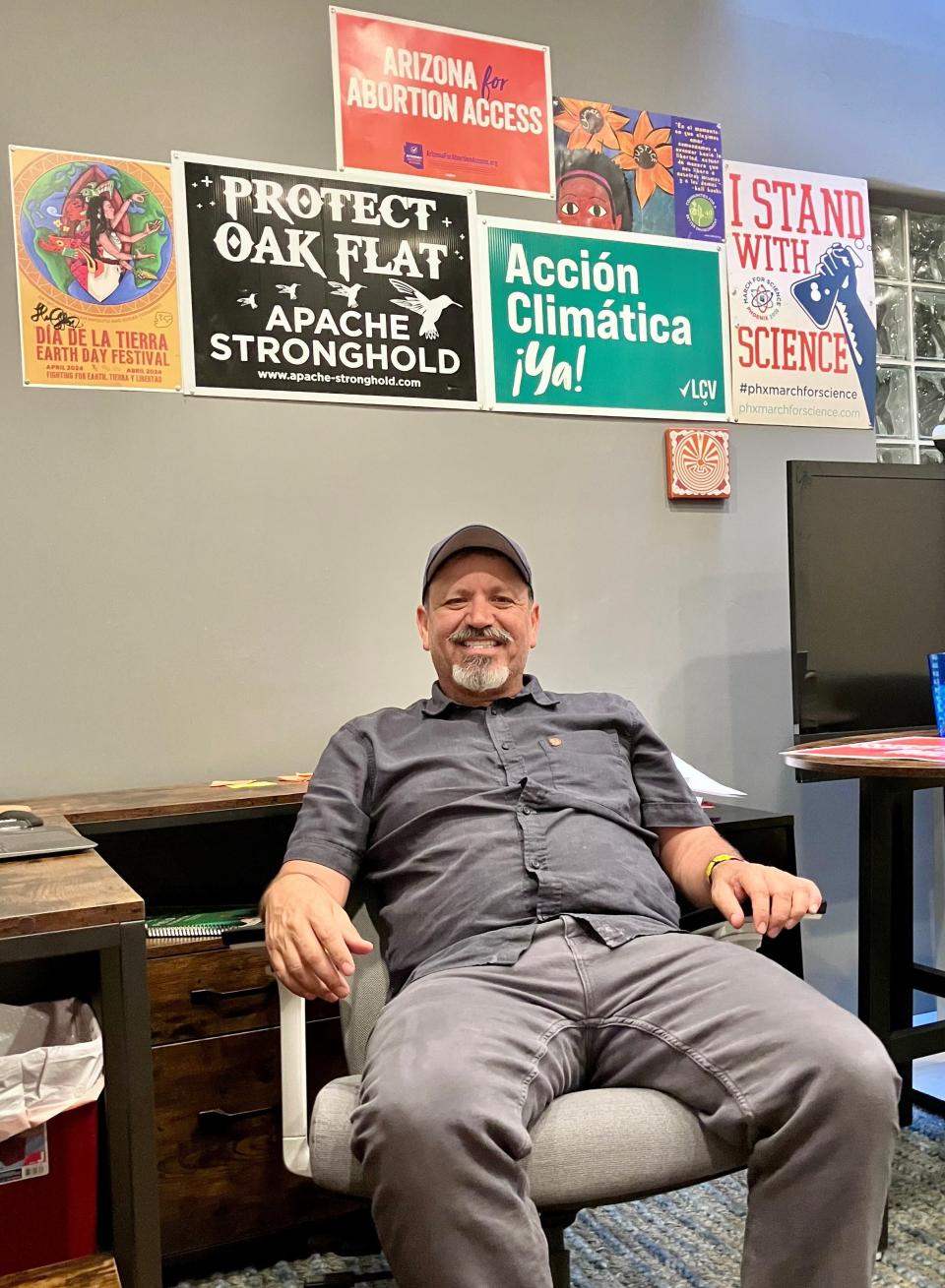
Although Chispa AZ is a politically engaged organization focused on alleviating environmental injustices affecting Arizona's Latino populations, Perea, who serves as its deputy director, says the monthly Community Circle is a politics-free space. Participants are not to judge, interpret, criticize, give advice, make speeches or discuss controversial ideas. Otherwise, he said, it's a place for whatever conversations the community feels it needs to have and for whatever emotions need to be shared to foster healing.
Something related to the warming, drying climate comes up almost every month, Perea said, often in the form of mothers struggling to manage their child's asthma or their own exhaustion during heat waves. In general, Latino neighborhoods in Phoenix are known to be hotter, more polluted and lacking in shade compared to whiter, wealthier areas in the valley. Minority populations are also more likely to be exposed to extreme weather while working outdoor jobs and to limit air conditioning use to reduce utility bills.
Chispa AZ has helped get electric school buses and more tree shade into predominantly Latino school districts, and works to grow civic engagement and political power against these harms. In January 2023, the group began addressing an additional need: mental health support to navigate feelings of loss and hopelessness.
More: How a Phoenix district's electric school buses could protect kids and help them learn
While not specifically focused on concerns related to climate change, Chispa AZ's Community Circle is one of few public options for Phoenix residents wanting to connect with others in person on this issue. Unlimited Potential, a health-focused nonprofit based in Phoenix that also serves mostly Latinos, also hosts gatherings where people can discuss what has become known as "climate anxiety."
In other areas of the country, "climate cafes" have popped up, offering regular meeting places for people struggling to process the emotions that come with watching political leaders do little to ensure a livable environment, despite four decades of warnings from scientists about the risks of burning fossil fuels.
Therapists around the world have also reported an uptick in clients seeking climate counseling that matches the escalating pace of not-so-natural disasters. A research study published in early April that surveyed 573 psychotherapists in Germany found that 72% reported having a patient bring up climate change in therapy sessions, and 41% of those had a patient come to therapy specifically for that reason.
But, as climate change becomes increasingly destructive, the need still outstrips the available care.
Psychiatric help, 'Peanuts' style
Kate Schapira saw this need before almost anyone else. In 2014, she started offering free climate anxiety counseling via a makeshift "Peanuts-style" booth in public places around Providence, Rhode Island, where she lives and teaches nonfiction writing at Brown University.
Earlier this Earth month she published a book, "Lessons from the Climate Anxiety Counseling Booth," that compiles and reflects on these experiences. At first, she found her conversations with strangers at the booth often started out being about issues seemingly unrelated to climate change — financial pressure, family or neighborhood conflict, dealing with flooding damage after a storm. But over time, many stressors seemed to lead back to exactly that.
Aiming to bridge the shortfall of organized care, the book offers targeted strategies similar to those guiding Chispa AZ's Community Circle practice. Exercises in each chapter outline how people can form support networks around managing the anxiety, stress and grief that increasingly bubble up as they bear witness to long-forecasted climate impacts becoming reality.
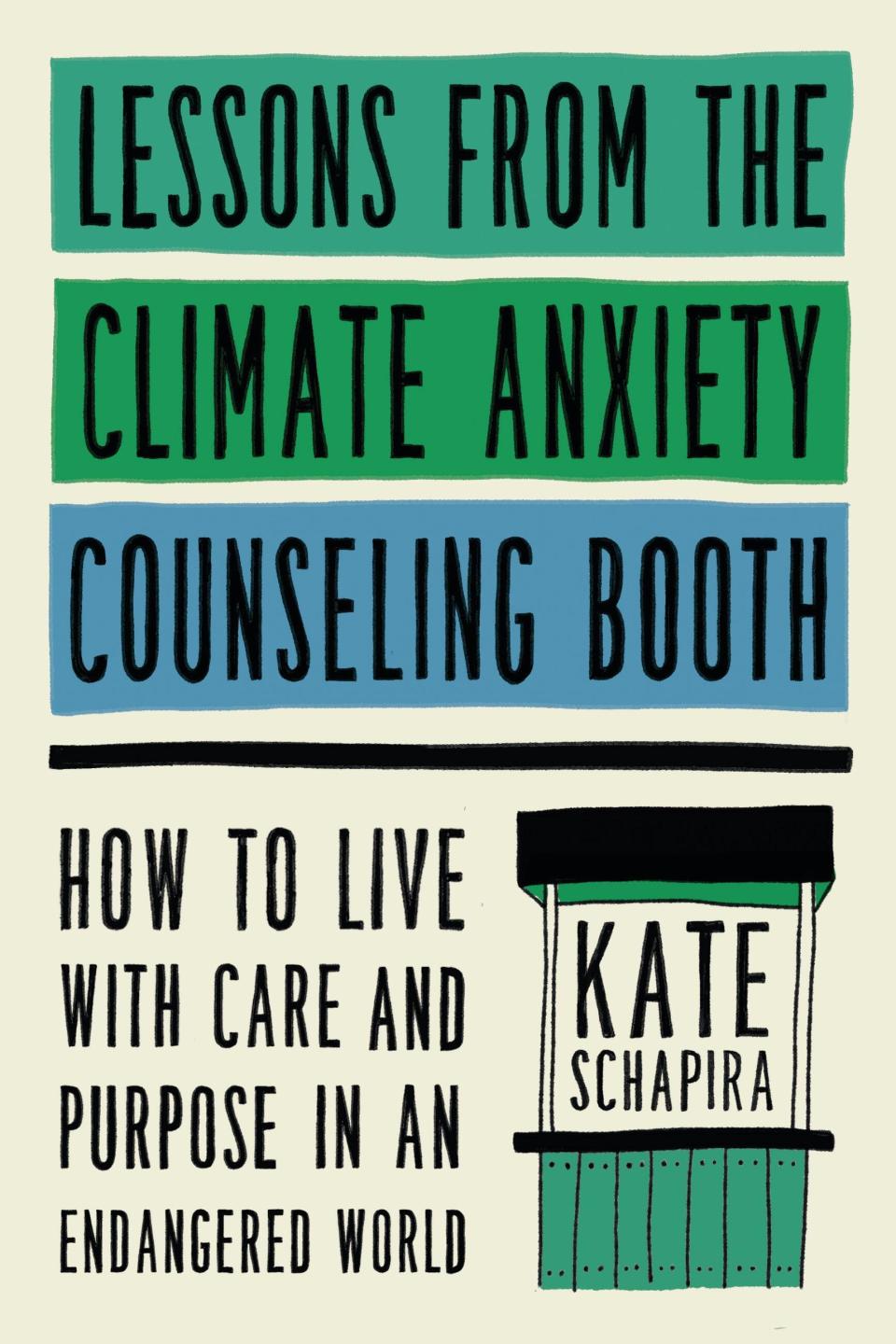
In her third chapter, titled "Managed Burn," Schapira guides readers through deepening their connections to nature by first bearing witness to intricacies of the plants, animals and landscapes around them, which she sees as a necessary prelude to properly grieving what is being lost.
"Acting like the elements of a living system don't depend on each other means you have to deliberately ignore a lot of evidence," Shapira writes, adding that many social, political and economic systems are set up to do exactly that, viewing nature in terms of "resources" and extracting its value.
"Bringing life back into your connections with the living world might be painful, like when blood flows back into your foot after it's been asleep," she writes. "Once you've aligned yourself with the living world, you care about it. This is the risk we take in knowing and needing each other."
In the practice that follows, Schapira directs readers to ask a respected elder to describe changes they have noticed in the living world over their lifetimes, and to take note of emotions the answers evoke. The Arizona Republic's own Indigenous Affairs reporter and enrolled member of the Jolon Salinan tribe, Deb Krol, is quoted in the chapter, offering solidarity and community wisdom from the other side of devastating loss.
"We Indian people, we're already in a post-apocalyptic world," Krol told Schapira. "Our apocalypse has happened. And now we're picking up the pieces and trying to rebuild our civilizations. And so, because we already have this knowledge, we can be of use to the rest of the world when their apocalypse happens too."
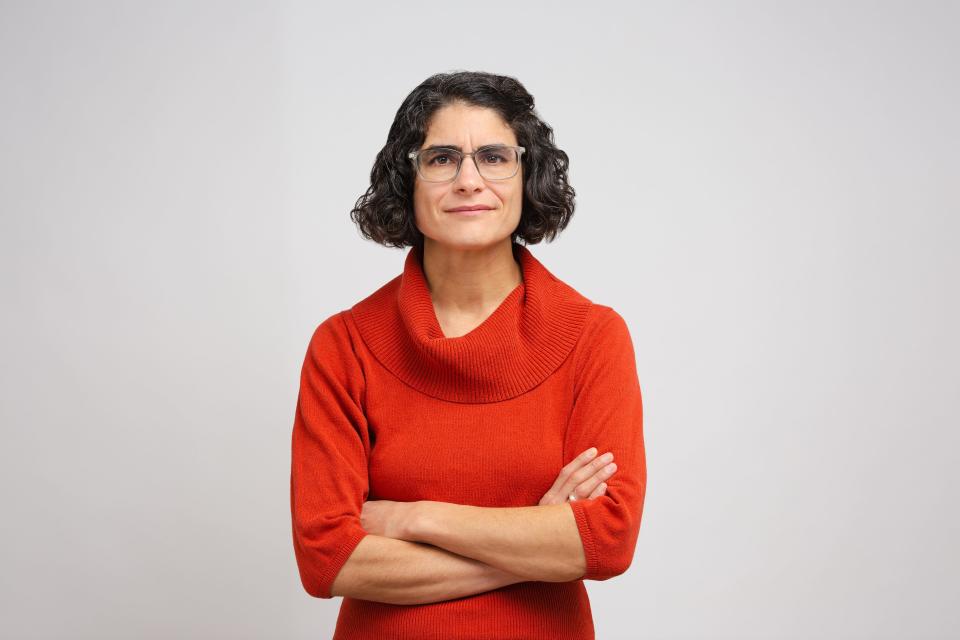
My own climate anxiety drove me to connect with Schapira back in 2019. I had just left an ecology research path to pursue environmental journalism, thinking maybe that was the missing piece to helping the public hear what scientists saw. I knew I felt anxious about environmental degradation, but the vocabulary around this struggle wasn't yet mainstream.
To find my own sense of community, I had started a climate fiction book group in 2017. We read books like Paolo Bacigalupi's "The Water Knife," set in a desiccated future Phoenix, and Kim Stanley Robinson's "New York 2140," set in a Manhattan inundated by sea level rise. We would talk about how scientifically believable we thought the scenarios were and what society should be doing now to keep them fictional.
Read my hate mail: The climate crisis stresses me out, too. But I'll read the hate mail and call it hope
I wanted to know who else was out there having similar conversations, and to what end. Over the phone in 2019, Schapira told me about her counseling booth and her theory that communities of people are easier to motivate to self-preserving action when they feel connected to each other and the problem.
Five years later, nearly everyone has heard of climate anxiety and a spate of related terms, including eco-anxiety, eco-grief, and solastalgia, defined in a 2007 research paper as "the distress caused by environmental change." And communities everywhere are finding new ways to both celebrate and grieve life on Earth as a necessary step in saving what's left.
'That's an ongoing part of life, grieving'
From Tucson, Maria Renee Johnson has brought climate counseling into the Zoom era. The science-trained artist offers a virtual five-week eco-grief workshop on a sliding payment scale to provide "a space to collectively encounter our grief, co-create community and to more deeply understand and connect to the ecologies in which we are embedded."
For her, this project has been a long time coming.
“I feel like this work has called to me my whole life," Johnson told me. "I’ve always felt a lot of grief around loss of the environment. Then I finished my science degree in 2020, and there was just a lot of grief, a lot of fear, a lot going on. I was in Oregon and we had intense wildfires that year, and I just noticed how profound the need was for space to feel and grieve and just recognize collectively where we are at.”
Environmental legislation in AZ: Water, climate, environmental justice: Bills to watch at the Arizona Legislature in 2024
She sought out grief counselors as teachers and pieced together mental health survival strategies until she felt she could offer peer support, starting with small in-person gatherings.
“When people show up to those spaces it is so clear that this is a hole in the fabric of our society that we don’t have collective spaces to grieve with one another," she said.
Now, Johnson typically runs her virtual course annually in the fall, which she has found to be when people are tuning into their grief. That's especially true for Arizonans, she said, who, in the aftermath of surviving another sweltering summer, are often eager to seek out solidarity and solutions. She's had about 30 participants so far, hailing from various backgrounds, demographics and locations.
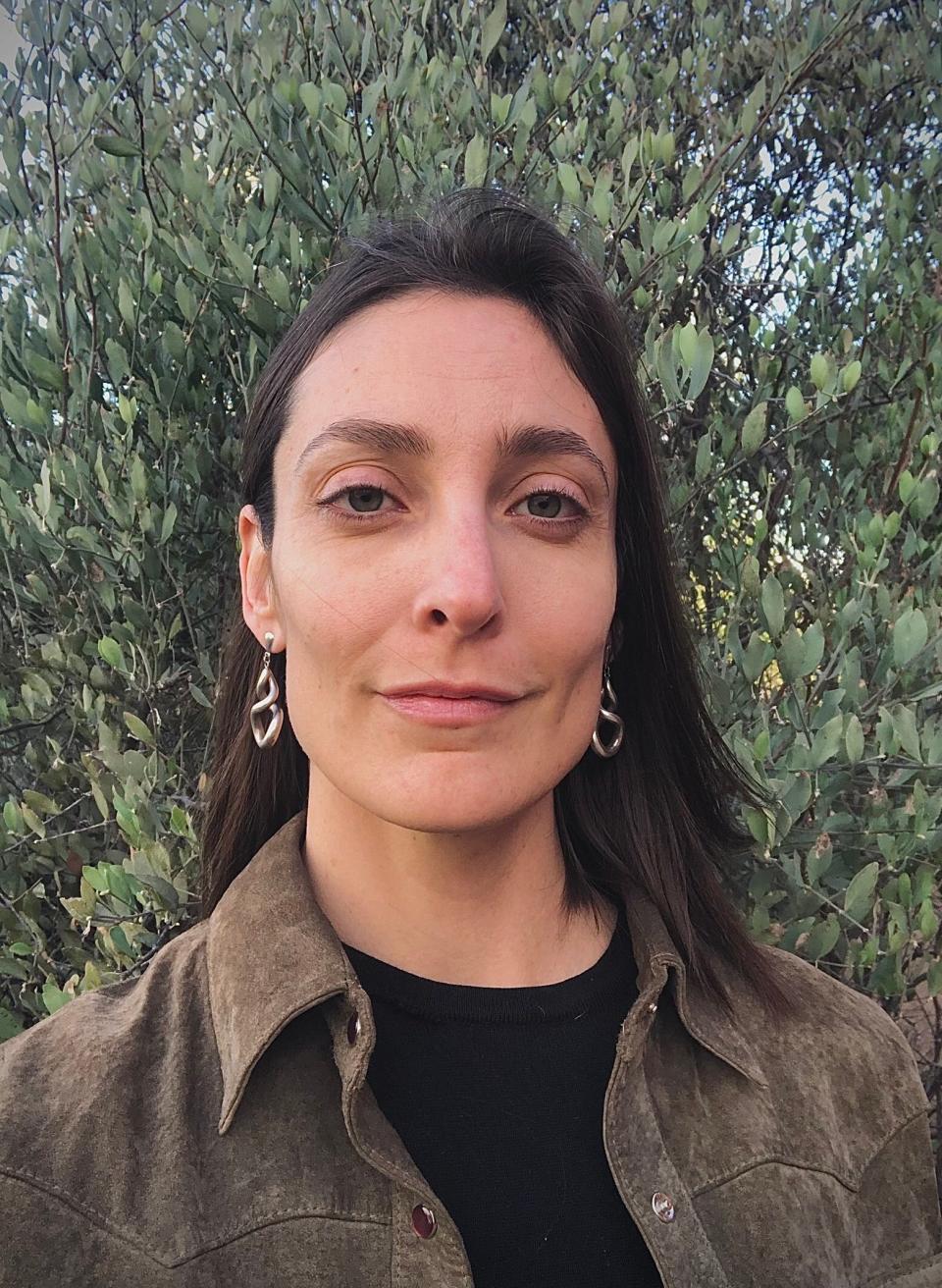
By Earth Day 2024, Phoenix had already logged its first triple-digit temperature of the year, heralding a summer season that is trending earlier every year. As the days lengthen and the mercury rises, so too will the prevalence of anxiety, stress, anger, grief, fatigue, irritability and other emotions researchers have linked to heat.
Johnson recommends first fostering connection to community, then taking purposeful steps to recognize and process environmental loss and climate-influenced hot headedness. Her approach feels like a blend of Schapira's exercises to reconnect with nature through deep observation and Chispa AZ's welcoming, musical invitation to acknowledge life's inevitable devastations.
The similarities suggest a convergence, a circling in, on ideas that work.
Read our climate series: The latest from Joan Meiners at azcentral, a column on climate change
For Johnson, the process of counseling others through eco-grief is circular in that she feels offering it has facilitated her own healing and sense of gratitude for the nature we still have, and the fact that people want to convene to recognize it, together.
“People often ask me, ‘Why would you ever want to do grief work, it must be so sad?’" she said. "But it’s actually the opposite. It’s profoundly beautiful because I get to see how much people care and the love we have that is still very much alive. It’s a constant reminder to continue to process my own environmental grief and of the importance of it. That’s an ongoing part of life, grieving.”
Joan Meiners is the climate news and storytelling reporter at The Arizona Republic and azcentral.com. Before becoming a journalist, she completed a doctorate in ecology. Follow Joan on Twitter at @beecycles or email her at joan.meiners@arizonarepublic.com. Read more of her coverage at environment.azcentral.com.
Sign up for AZ Climate, The Republic's weekly climate and environment newsletter.
Support climate coverage and local journalism by subscribing to azcentral.com at this link.
This article originally appeared on Arizona Republic: How to grieve and celebrate endangered life on Earth

